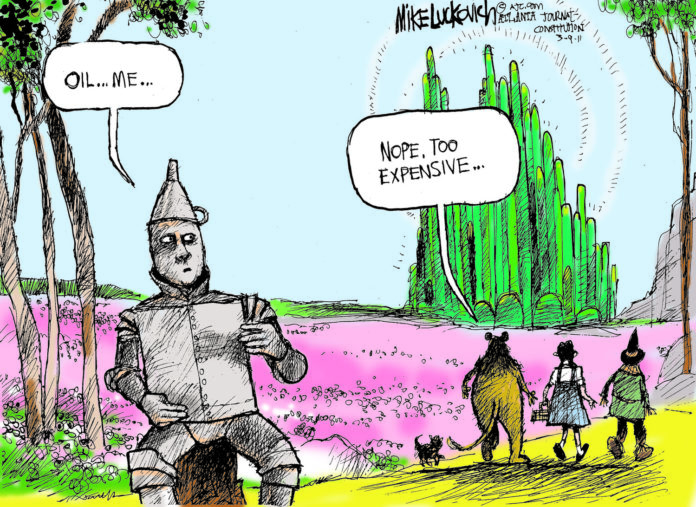BY EDWIN E. VINEYARD
Who is to blame for high gasoline prices? We have a lot of ideas circulating around, most of which are not correct. While fault [or cause] may be spread around to involve several entities, persons, or events, it is unlikely that most of us are actually blaming the right people.
For one, the precipitating event or underlying cause may be easily identified, and about this there may not be a lot of disagreement. The calamitous change in the Middle East has caused anxieties about petroleum supply. These anxieties have, in turn, caused others to respond in ways that have caused a tremendous volatility in oil prices, which have translated into higher gasoline prices.
It should be understood that there is no actual shortage of global oil supply or oil supply in the United States. The shortfall in Libyan fields has been made up by expansion of production in Saudi Arabia and other places. Again, there is NO global shortage of oil, and none in this nation.
Further, there is no international shortage of gasoline being produced. This country is NOT short of gasoline supply. Nor has our American demand for oil and gasoline expanded. Rather it has tended to diminish somewhat due to conservation measures and smaller, more fuel efficient cars.
It should be clear then that our current high gasoline prices are NOT the result of either supply or demand factors. Yet we know from our study of economics that supply and demand vectors set the prices of goods and commodities. Have we been led astray by our economist friends? No, not at all.
It means that there are extraneous factors intruding into the oil and gasoline market, other than basic supply and demand.
We should hasten to absolve President Obama of direct blame for gasoline prices, and we should do the same for the former President Bush for those in his term. Releasing our oil reserves is not the answer, because there is no supply shortage. But there may be other actions within the purview of a president which could be helpful in avoiding or alleviating such crises. That will be discussed later.
One of these is anxiety, alluded to above. Anxiety tends to create ripe opportunities for Wall Street speculators in futures for commodities, in this case oil and gasoline. And, therein, lies the real explanation for high gasoline prices.
Of course, domestic oil companies tend to delight in high oil prices, because as suppliers they make a windfall profit from their local product. But they do not necessarily profit from the shooting global markets beyond the extent of their international operations. Oil royalty owners and producing oil companies in this country find themselves on a gravy train when global prices skyrocket while their local production costs go relatively unchanged.
So, yes indeed, oil companies are reaping rich benefits from spiking oil market prices. Their profits go up. Those of us who own a little oil company stock think we are getting ahead with our tiny share of that prosperity. But, we repeat, the oil companies are NOT necessarily causing the spikes in prices at all, although they may indeed benefit from them. Neither is OPEC, although they profit also.
We have commodities speculators nowadays who, through market machinations, drive up the price of almost all the consumer goods we purchase. These people are not only heavily responsible for the high oil and gasoline prices, but they are also responsible for the higher food prices we are paying at the grocery store.
Both suppliers and buyers in the commodities market employ futures contracts to hedge against sharp changes in price and assure themselves that they may sell or buy their product at a known future price. Sometimes called “hedging,” this is a common business practice. Your natural gas utility tries this, with varying luck.
The problem arises from others – speculators, who enter the market as gamblers, making their bets and running up prices. As a part of the New Deal financial cures, the law gave commodities regulators powers to control speculation, so that market was dominated by suppliers and buyers. Until the first Bush’s term, speculators were highly controlled, but commissioners have since allowed growth speculator share to the point of dominating the markets.
Politics is involved to the extent that one holdover Republican commissioner, having a deciding vote, will not vote to curtail speculation. His term expires this year. At that time, there is some hope to regain market stability, if our president chooses and can get a different appointment through. It will not be easy.
If the names Morgan Stanley and Goldman Sachs mean anything from the late Wall Street meltdown, throwing our economy into recession, then label these two Wall Street giants as culprits again. Together they control most of the commodities futures markets. Those very same markets are running up your grocery bill, and they are running up your gasoline prices – more than could ever be justified by the anxieties over the Middle East.
But these two Wall Street firms are major political donors as well. If there were only a way for all of us to follow the money and really know what these people are scheming. Would that we could wrest control of our own political affairs back from the business interests which are dominating our country.
Where is the Tea Party when you really need them? Well, they are frolicking on the other side against the interest of the people, blissfully ignorant.
But you wanted to know why you are paying high gasoline prices, and this has been a very long answer. As one of my university professors used to say, “Well, I understand this now, so its time to move on.”
– Dr. Edwin E. Vineyard, aka The Militant Moderate, lives in Enid, OK and is a regular contributor to The Oklahoma Observer








